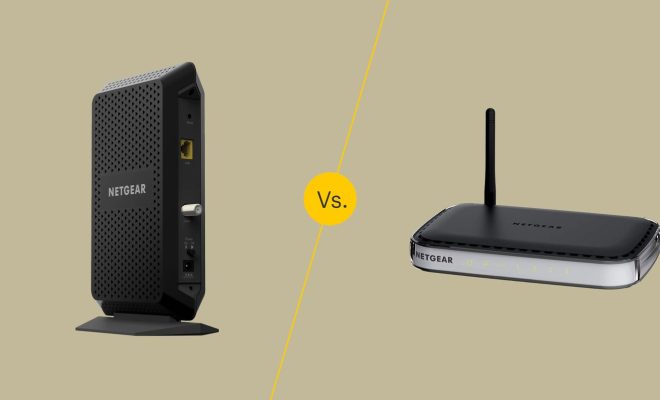Modem vs. Router: How Do They Differ?

In today’s world, the internet plays a huge role in our daily lives. It has become an essential tool as it enables us to communicate, learn and work from various locations. In order to get connected to the internet, we all need a device that can bridge our computers to the internet. However, when it comes to internet connectivity devices, most people usually get confused between modems and routers.
Even though they might seem similar, modems and routers have different functions. A modem acts as the device that connects your computer to the internet service provider (ISP) while a router helps to distribute the internet signals to different devices within your home or office. Below, we will explore the differences between a modem and a router.
Functionality
The primary function of a modem is to communicate with the ISP and establish an internet connection. A modem is connected to the service provider by either a cable, fiber or DSL. The modem then converts the data from the ISP into a digital signal that can be understood by your computer.
On the other hand, a router is used to connect multiple devices to a modem and distribute the internet signals to each device. The router helps to prevent interference between devices and creates a secure network for devices to communicate with each other.
Design
Compared to a router, a modem is a relatively simple device with fewer features. Modems are usually small and have only one or two ports that allow a single computer or router to be connected. Modern modems are designed to facilitate high-speed internet connections, and they come in various models, including cable and DSL modems.
Routers are more advanced devices as they are designed to manage multiple devices within a network. The size of a router can vary depending on the number of devices it can connect. Routers have several ports that allow the connection of multiple computers, smartphones, tablets, and other devices. They are designed with built-in firewalls that help to protect the devices within the network from cyber threats.
Cost
The cost of a modem and a router can vary depending on the model and brand. Typically, modems tend to be cheaper compared to routers. However, if you decide to buy a router with advanced features such as VPN capabilities, it can cost you significantly more money. In most cases, ISPs will provide you with a modem along with their internet service, and you will have to purchase a router separately.
In conclusion, while modems and routers might seem similar on the surface, they have significant differences in functionality, design, and cost. Understanding these variations is essential, especially when it comes to setting up a home or office network. Whether you decide to purchase a modem, router or a combination of both, it is important to consider your internet speed requirements, the number of devices that need to be connected to the internet, and the level of security you want for your network.






